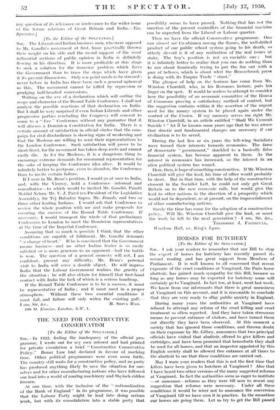[To the Editor of the SPECTATOR.] - -The Liberals and
Indian business men, whowere opposed to Mr. Gandhi's movement it first, have practically thrown their weight on his side and the moral support of the most influential sections of puhlie opinion in India is definitely flowing in his direction. It is more profitable at this stage to seek a solution for the immense problem which faces the Government than to trace the steps which have given it its present dimensions. Only one point needs to be stressed : never before in India has there been such a general upheaval us this. The movement cannot be killed by repression or grudging half-hearted concessions. Writing on the eve of a declaration which will outline the
scope and character of the Round Table Conference, I shall not analyse the possible reactions of that declaration on India. But I shall be very surprised if even Indian Liberals and other progressive parties (excluding the Congress) will consent to come to a " free" Conference without any guarantee that it will discuss a Dominicn Constitution for India. There is a certain amount of satisfaction in official circles that the cam- paign for civil disobedience is showing signs of weakening and that the Moslems arc willing to send their representatives-to the London Conference. Such satisfaction will prove to be short-lived, for the movement has taken deep roots and cannot easily die. As fir the Moslems, it is a dangerous thing to encourage extreme demands for communal representation for the sake of keeping the Conference idea alive. It would be infinitely better to postpone, even to abandon, the Conference than to invite certain failure.
If I were in Mr. Bern's position. I would go at once to India, and, with the Viceroy, hold a Conference —informal and consultative—to which would be invited Mr. Gandhi, Pandit Mot ill Nehru, Mr. V. J. Patel (ex-President of the Legislative Assembly), Sir Tej Bahadru Sapru, Mr. Jinnah, and two or three other leading Indians. I would ask that Conference to review the whole position with me and make proposals ffir ensuring the success of time Round Table Conference. If necessary, I would transport the whole of that preliminary Conference to London to meet the Dominion representatives at the time of the Imperial Conference.
Assuming that so much is possible I think that the other conditions are capable of fulfilment. Mr. Gandhi demands " a change of heart." If he is convinced that the Government means business—and no other Indian leader is so easily satisfied or is more generous to an opponent half the battle is won. The question of a general amnesty will not, I am confident, present any difliculty. Mr. Bean's personal visit to India will serve a double object. He will impress India that the Labour Government realizes the gravity of the situation : he will also obtain for himself that first-hand contact with India the lack of which is a serious handicap.
If the Round Table Conference is to be a success, it must be representative of India ; and it must meet in a proper atmosphere. Without these two essential conditions it must fail, and failure will only widen the existing guff.—




































 Previous page
Previous page